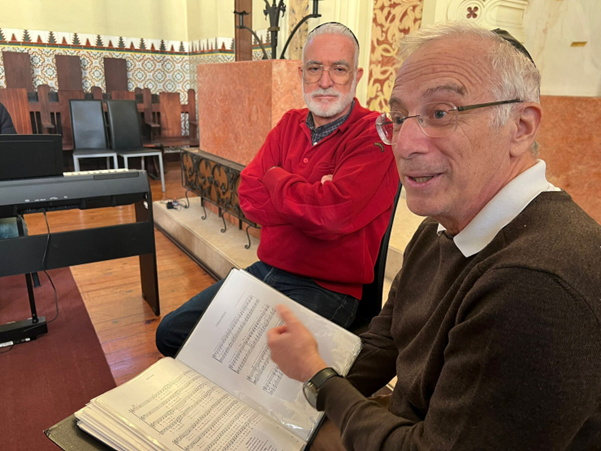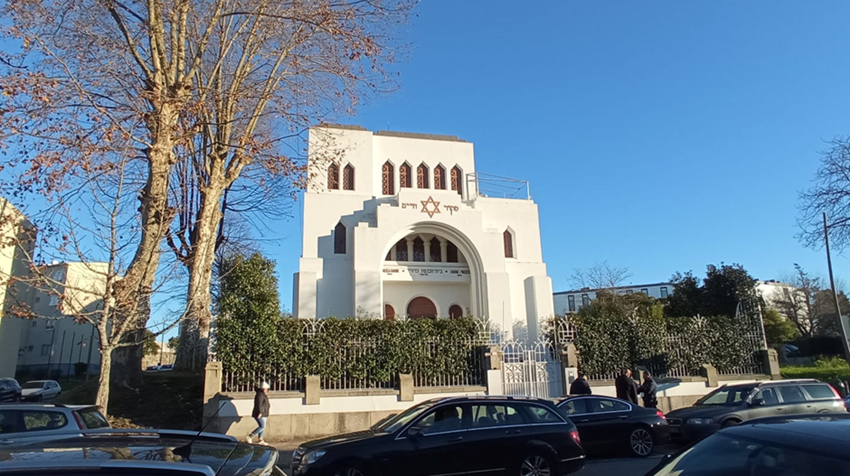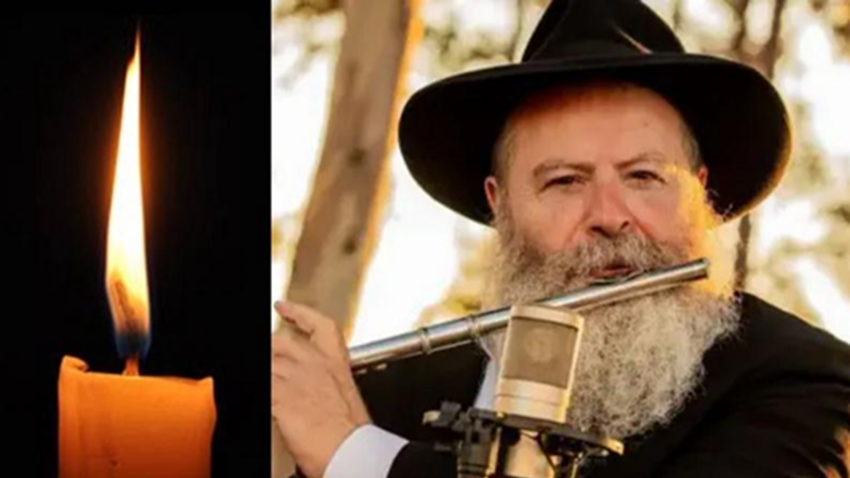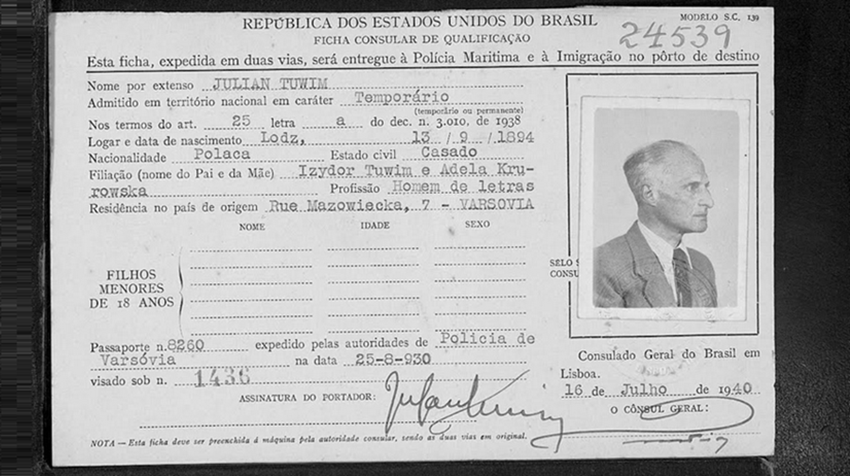Kadoorie Synagogue - Mekor Haim (Fountain of Life) | Image: Fernanda Lima
Anyone who walks through the streets of Porto could not imagine that in the middle of Rua Guerra de Junqueiro is the largest Synagogue in the Iberian Peninsula, the Kadoorie – Mekor Haim Synagogue. Inside the synagogue, we find the Mekor Haim Choir, founded in October 2020, with the intention of "Teaching and performing Jewish, Sephardic, and Hebrew liturgical music for the education and enjoyment of its members and the community at large."
Yonah Yaphe (68 years old) together with his friend Luciano Moura, decided to create the choir. The idea started with Yonah, who was a member of the Shira choir in Israel and Coro Mille Voce in Porto. The desire to create a choir in the synagogue was great, he says, whenever he sat in the synagogue, during services. In conversations with Luciano, “We felt the need to make a choir there.”
The founder of the Mekor Haim Choir says that "the idea started in the year of the pandemic, when the activity of other choirs stopped and Luciano's son, Ricardo, met Maestro Leonardo at the University of Porto. It was a combination of things."
The desire was so great that these three members of the choir met on October 27, 2020 in Yonah's living room, next to the piano, and formed the choir. Since then, the choir has continued to grow.
Leonardo Mendonça is the conductor of the choir. He graduated in lyrical singing from the State University of Minas Gerais, in Brazil and is a vocal coach, musical director and award-winning composer of several works.






Yonah Yaphe, Luciano Moura and Leonardo Mendonça | Image: Fernanda Lima
The group has had members from various locations in Canada, Lisbon, Brazil, and Israel, but most of the 13 current members are from the Porto area.
There are no age restrictions, with ages ranging from 20 to 73 years old.
Yonah Yaphe says that "there is no limit, because there is also no limit as to religion. All are welcome who are interested in Jewish music." Luciano Moura adds that the choir "extends an open invitation, not only to the Jewish community, but also to the community at large".
The choir is a way to bring together the Jewish community of Porto and beyond.
"We usually perform on the last Friday afternoon of the month in the for groups of students or tourists who visit the Holocaust Museum in Porto," located near the Synagogue.
The Mekor Haim Choir highlights Jewish musical culture to tourists and the general population, who welcome it with enthusiasm. "People react with a lot of sympathy, there are a lot of people who don't know Jewish popular and liturgical music. Even people in the synagogue react with surprise, because this music has a mixture of songs in Hebrew and songs in Ladino (Judeo-Espanhol). The material reflects the diversity of the community."
Diversity characterizes this group that performs and participates in various events that connect different communities. Recently, they had a successful performance at the School of Music and Performing Arts (ESMAE), in the Polytechnic School of Porto.
The rehearsals usually take place in the Synagogue on Friday afternoons, with some exceptions, when they rehearse in the house of a member of the group. The synagogue is a place where they feel welcomed and united, so most of the rehearsals are held there. "The acoustics are fantastic, under the dome. We also have a connection to our legacy. We are the voice of the community."



Mekor Haim Choir (Fountain of Life) | Image: Fernanda Lima
The taste for singing and music and the pride of having created this choir are obvious on the part of the two founders. They are joined by maestro Leonardo Mendonça, who agreed to lead the choir when he met Luciano Moura's son, who said that "his father's dream was to have a choir in the community". Leonardo says: “Yonah invited me and we arranged our schedules. The time was chaotic because it started during the time of the pandemic. It has now been 3 years, since we started in 2020. The organization of everything was very difficult, due to the lockdown, until we found a way to have virtual rehearsals. We started online by using Zoom for video and audio then added another program, Jamulus, to synchronize the sound. We are now using both for weekly on-line rehearsals on Monday evenings. We have had singers from Canada and Argentina. That's the basis of the story, which started due to the strong will of those two (Luciano and Yonah)".
The choir's musical repertoire includes various types of music: "We have songs that are from the liturgical repertoire, that are arranged for 3 or 4 voices and popular songs from the Jewish tradition, which are not necessarily liturgical but have importance for the history of the Jewish people."
Yonah and Luciano are considered, by Leonardo to be the living encyclopedias of the choir. They are the ones who bring the stories and the songs that are not just songs.
"They are songs that are sung in the liturgy, and by mothers, fathers and children." These are songs that are part of the community, whether in childhood or in other stages of growth. Leonardo says that: "The songs not only bring the history of the composition, but also the history inserted in the composition. The music is more than a melody. It is something with history and memory that brings a connection to the Jewish people.”
Currently, many of the songs performed are from the Psalms of David, such as Psalms 146 and Psalm 128, which are part of the daily and Sabbath prayers. There is also a project to introduce songs in Yiddish, such as Raisins and Almonds and Oyfn Pripetchik. The choir has introduced the community to the works of the Italian Jewish composer, Salomone Rossi, This is a vast and important body of work and the choir is dedicated to intensifying its study of it.

Mekor Haim Choir (Fountain of Life) | Image: Fernanda Lima
The choir has an important role to play in the preservation of Jewish culture, whether in the dissemination of musical culture, or in its prominence of the community, making it important to make this musical genre known to people outside the community. The Maestro considers that this is a very rich and important culture: "It is in fact essential that many people have access to this culture". He feels that in terms of dissemination, the community already does this brilliantly: "We have a lot of events in the community in general, not only in the Jewish community. The repertoire is of high cultural value."
Rudi Guimarães is one of the youngest members to participate in this choir. He joined in September 2023, after attending a community event where the choir participated. For this young man, it is: "a source of pride and an honor to belong and be part of the choir". Despite being one of the most recent members the choir, it has already become important in his life. There he feels part of a family. "We're all friends, it's like a big family." In the future, he intends to improve and continue to discover his voice alongside "great singers and people who I have great admiration for, being able to know them and live with them".
https://video.wixstatic.com/video/854e00_d0ed8fdef30d46ffb3021af495be7775/360p/mp4/file.mp4
Lecha Dodi Song | Recording: Fernanda Lima
By: Fernanda de Lima, Filipe Vilhena, Francisca Cruz, Gonçalo Barge
Translation from the original Portuguese text: Yonah Yaphe


































